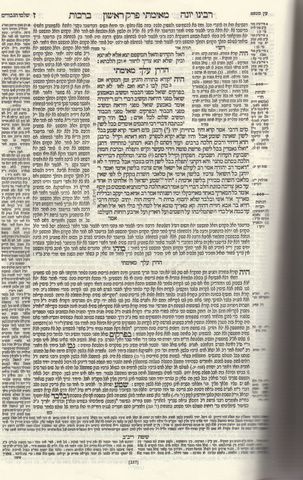
{From the Mishna:}
"[A PRAYER] WHICH THEY ORDERED TO BE CONCLUDED [WITH A BENEDICTION] MUST NOT BE LEFT WITHOUT SUCH A CONCLUSION;"
{Brachot 12a}
It is obvious that one who takes a cup of wine in his hand, thinking it is beer, begins with the blessing of beer {Shehakol} and finishes with the blessing of wine {HaGafen} fulfills his obligation, for even if he finished with the blessing of beer has fulfilled, for we have learnt: and on all of them if he says Shehakol Nihyah Bidvarohe has fulfilled.
But one who takes a cup of beer in his hand, thinking it is wine, begins with the blessing of wine and finishes with the blessing of beer, then what?
Do we go after the opening or after the ending?
And we do not resolve {this question}, and we act leniently, and we do not go back, for in a case of doubt in Rabbinic law we rule leniently.
We learnt in a brayta: in the morning, one who opened with yotzer `or {the appropriate blessing during the day} - and ended with ma'ariv 'aravim {the appropriate blessing during the night} - he did not fulfill {the obligation. During the day} if he opened with ma'ariv 'aravim and ended with yotzer `or fulfills. In the evening, if he began with ma'ariv 'aravim and ended with yotzer `or he did not fulfill; if he opened with yotzer `or and ended with ma'ariv 'aravim he did fulfill. The rule of the matter:all goes after the ending.
What if meant to be included by "all?"
To include on who ate dates and thought he ate bread, began the blessing for bread and finished with that of dates has fulfilled; or, if he {ate dates and} started with {the blessing} for dates and ended with that of bread has fulfilled.
What is the reason?
Because dates also give sustenance.
Rabba bar Chanina Sava cited Rav: One who does not say Emet Veyatziv {the paragraph after Shema} in the morning

, and Emet VeEmuna {after the Shema} in the evening, has not fulfilled his obligation.
What is the reason? It states in Tehillim 92:3:
What is the reason? It states in Tehillim 92:3:
| ג לְהַגִּיד בַּבֹּקֶר חַסְדֶּךָ; וֶאֱמוּנָתְךָ, בַּלֵּילוֹת. | 3 To declare Thy lovingkindness in the morning, and Thy faithfulness in the night seasons, |
Shmuel said: What is the reason? It states in Tehillim 146:8:
| ח ה, פֹּקֵחַ עִוְרִים--ה, זֹקֵף כְּפוּפִים; ה, אֹהֵב צַדִּיקִים. | 8 The LORD openeth the eyes of the blind; the LORD raiseth up them that are bowed down; the LORD loveth the righteous; |
{Brachot 12b}
Rav Sheshet, when he bowed, bowed like a reed, and when he straightened up, he straightened like a serpent.
And Rabba bar Chanina Sava {the elder} cited Rav: The entire year a man should pray haEl haKadosh {the holy God -- in the third blessing of Shemoneh Esrei} andmelech oheiv tzedaka umishpat {king who loves righteousness and judgment -- in the eleveth blessing}, except in the ten days between Rosh HaShana and Yom Kippur, in which he prays haMelech haKadosh {the holy King} and haMelech haMishpat {the King of judgement}.
Rabbi Eleazar said: Even the ten days between Rosh HaShana and Yom Kippur, if he says haEl haKadosh and haEl haMishpat (!!) has fulfilled, as it states in Yeshaya 5:16:
| טז וַיִּגְבַּהּ ה צְבָאוֹת, בַּמִּשְׁפָּט; וְהָאֵל, הַקָּדוֹשׁ, נִקְדָּשׁ, בִּצְדָקָה. | 16 But the LORD of hosts is exalted through justice, and God the Holy One is sanctified through righteousness. |
What do we say on this?
And we leave off with saying that the halacha is {is like Rabba and we say} haMelech haKadosh and haMelech haMishpat. And from the fact that we come out like this, we deduce that we do not hold like Rabbi Eleazar who says that if he says haEl haKadosh and haEl haMishpat has fulfilled

, but rather he has not fulfilled, and since he has not fulfilled he must go back, and so is the halacha.
End Perek.
Hadran Alach MeEimatay.
No comments:
Post a Comment